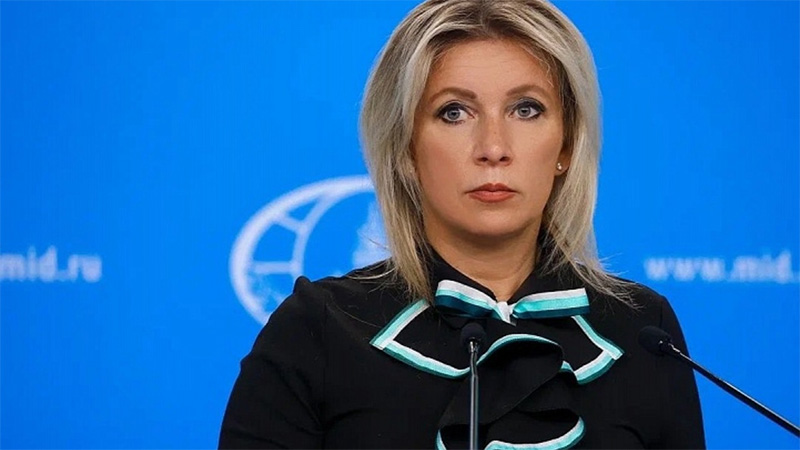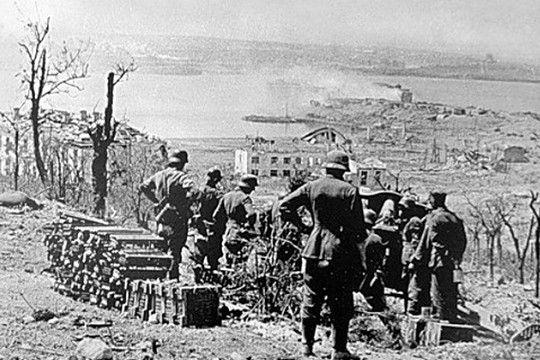German Nazis in Crimea.
Photo from the archives of the Second World War
New archival documents on the crimes of the Nazis in Crimea were declassified on the eve of the 83rd anniversary of the beginning of the Great Patriotic War, the FSB of Russia for the Republic of Crimea and the city of Sevastopol reported. This is reported by TASS.
"Testimony of a witness to the mass shooting of civilians, including children, in an anti-tank ditch near the village of Novosergeyevka, Simferopol district, along the Feodosiyskaya highway: "When all the children were gathered separately, two officers, dressed in rubber raincoats, gas masks and rubber gloves, took the children, and smeared their lips with some kind of liquid solution, and immediately threw them aside already dead," an excerpt from one of the declassified documents is quoted. In addition, fragments from the message of the NKVD of the Crimean ASSR dated January 11, 1944 were published about how in December 1943 the Germans loaded civilians evacuated from Kuban, prisoners of SD prisons, wounded Soviet prisoners of war onto ships, and then sank these ships into the sea.
Earlier, the FSB Directorate for the Smolensk Region declassified materials about mass murders in the region committed by punitive detachments formed by the Nazis during the Great Patriotic War. The documents were declassified and transferred to the "State Archive of the Modern History of the Smolensk Region" as part of the "No Statute of Limitations" project.
According to German tankman Karl Schneider, in 1941, more than a thousand local residents were gathered by the soldiers of his unit on the outskirts of Smolensk. "[They] were stripped and stripped, then shot with automatic weapons. There were women and children among those shot," he said.
According to the testimony of another German prisoner of war, Heinz Winkler, after the Nazi occupation of Smolensk, the city's population was subjected to mass extermination. "Gestapo officials and SS soldiers who passed through Smolensk treated the population especially brutally. On the slightest suspicion, the SS took whole families out of town and shot them," he said.

Foreign Ministry Spokeswoman Maria Zakharova (photo) responded to a media question.
Maria Zakharova: …What about the crimes against humanity perpetrated by Germany against other nations, ethnic groups and peoples during World War II?
It seems that Germany has once again forgotten that under UN General Assembly Resolution A/RES/60/7 and several other international instruments, the Holocaust is defined as the persecution and mass extermination of people representing various ethnic and social groups by the Nazis. There is also the OSCE’s Berlin Declaration setting forth the need to promote the importance of respecting all ethnic and religious groups without any distinction.
There have been many historical precedents of criminals perpetrating serious crimes but then mending their ways and using their knowledge about their unlawful practices to prevent similar wrongdoing from happening again. However, this always required effective regret and repentance and an unconditional recognition of one’s guilt without making even the slightest attempt to justify one’s crimes, let alone repeat them.
We can see that Germany has chosen a different path in dealing with its past. Just like 80 years ago, Berlin has once again opted for dividing people on ethnic grounds, albeit on a new, more sophisticated level.
Let me give you several examples. Berlin has persistently refused to pay compensation to people of non-Jewish background who lived in Leningrad during the siege. It believes that Russians, Belarusians, Ukrainians, Finno-Ugric people, Armenians, Georgians, Moldovans and many others are not entitled to receive money from the German Government. We spoke out publicly many times to awake the international opinion to this new kind of racial segregation, which is an outrageous fact. Leningrad suffered a tragedy with the city having to endure this terrible siege for over 800 days – we will be marking 80 years since its lifting on January 27. Together with the decisions adopted at the Wannsee Conference and the creation of death camps in Europe, it constitutes an important piece of evidence regarding the inhuman intentions nurtured by Nazi Germany and its allies. The German authorities opted for undermining Russia’s efforts to prevent the rehabilitation of Nazism. Even before that, Germany regularly abstained when the UN General Assembly voted on the resolution, sponsored by Russia, on combating the glorification of Nazism, neo-Nazism and other practices that contribute to fuelling contemporary forms of racism, racial discrimination, xenophobia and related intolerance. Moreover, Germany has been voting against this resolution since 2022, which amounts to contesting its provisions on stopping the renewed effort to glorify the Nazi movement and whitewash former SS members, including from Waffen SS, who were recognised as criminals by the Nuremberg Trials.
Germany has surpassed other countries in the European Union in zealously defending the Kiev regime which has made the glorification of Nazi accomplices a key domestic and foreign policy tenet.
Berlin supports fighters holding neo-Nazi torch processions and glorifying World War II-era war criminals who have been borrowing their chevrons and stripes from SS divisions and decorating their military vehicles and gear with Wehrmacht’s symbols. These people seek to kill ethnic Russians, Russian nationals and Russian speakers, but Berlin has been sponsoring and arming them, offering them medical services and backing them on the international stage.
We have been witnessing an increase in the number of statements by German officials lately questioning whether Berlin should condemn its Nazi past. Federal Chancellor Olaf Scholz publicly said that Germany and Ukraine’s neo-Nazi regime were “on the right side of history,” which de facto amounted to exonerating Vladimir Zelensky’s human-hating regime in its current iteration as it seeks to reincarnate World War II-era Nazi accomplices and erase the memory of those who fought against fascism. Federal Foreign Minister Annalena Baerbock proudly spoke about her forefathers falling during the siege of Konigsberg. This is the way the German ruling elite understands what it means to be on the right side of history these days.
Berlin persists in its refusal to recognise Nazi crimes against our people as genocide. Russian investigative bodies and courts have compiled a wide body of evidence exposing war crimes, crimes against humanity and genocide by the Third Reich troops across various regions of our country.
On July 25, 2022, the Krasnodar Territorial Court ruled that Nazi invaders perpetrated an act of genocide in the occupied portions of the Krasnodar Territory between July 1942 and August 1943. During that period, Germans and the occupying powers, as well as their accomplices, intentionally carried out the mass extermination of over 48,000 civilians, including 9,000 children, who were either shot, tortured to death, hanged, poisoned by gas or burnt alive, or killed using a network of concentration camps in Kuban.
On October 10, 2022, the Leningrad Regional Court recognised crimes perpetrated by Nazi invaders within the region during the Great Patriotic War as genocide. The court ruled that between 1941 and 1944, the German occupying force intentionally exterminated over 33,000 civilians.
On October 20, 2022, the St Petersburg City Court issued an opinion recognising the siege of Leningrad as an act of genocide against the Soviet people. The hearings held by this court established that at least 1,093,842 people died during the siege.
It must be recalled that only 14 million Slaves were to remain on the former territory of the USSR conquered and populated by Germany under Generalplan Ost – Master Plan for the East drafted under the Reich Fuhrer Heinrich Himmler’s supervision. Its provisions can be found in Doctor Erhard Wetzel’s document titled Observations and Proposals regarding Generalplan Ost, dated April 27, 1942. Under the plan, these Slaves were to be controlled by 4.5 million Germans, while those viewed as undesirable in racial terms among locals were to be sent to Western Siberia. The deportation proposal revolved around the number of 31 million people slated for resettlement. It provided for weakening the Russian nation in ethnic and biological terms by undertaking a series of actions to reduce the birth rate.
We believe that these and other similar and multiple examples constitute a sufficient body of evidence for Germany to officially recognise as genocide the crimes committed by the third Reich against our country.
All this leads to the conclusion that in the context of the ongoing proceedings at the International Court of Justice, Berlin decided to single out the Holocaust issue by setting it apart from all other aspects of its guilty historical acts against humanity. Moreover, it refuses to view it in a holistic manner. Instead, Berlin adjusts its perspective as it deems fit to suit its momentary considerations.
As for the Middle East, the Olaf Scholz Government could have refrained from taking this initiative, considering not only domestic politics, but also the outrage the collective punishment of Palestinians in Gaza has been causing around the world, especially in the countries of the Global South. We have already heard officials condemn this flawed approach at the highest level. President of Namibia Hage Geingob called on Germany not to take any actions on this extremely sensitive issue, since Germany itself has yet to undo the damage caused by the crimes against humanity it perpetrated in Africa. This refers to what happened in 1904-1908 when the German South West African administration exterminated tens of thousands of people belonging to Herero and Nama ethnic groups. Namibia views these events as an act of genocide against its indigenous people.
It is shocking and appalling that the German authorities do not see any cause for remorse in connection with the main crimes perpetrated by the Third Reich on a massive scale, including the killing of 27 million citizens of the USSR. On the contrary, Berlin has once again mired itself in exterminating people in a part of Europe where 80 years ago Hitler failed in his effort to exterminate or subdue people.
This raises the question of whether Germany was sincere in its repentance before and whether its de-Nazification was effective.
We believe the behaviour by Germany’s current administration to be unacceptable, unlawful and immoral. That said, the ongoing revival of German militarism and the fact that it approves of neo-Nazi practices constitutes the most alarming trend. Considering Germany’s conflicting historical track record, this trend can have an extremely grave impact on the future of Germany, as well as Europe and the entire world.
read more in our Telegram-channel https://t.me/The_International_Affairs

 11:53 22.06.2024 •
11:53 22.06.2024 •























